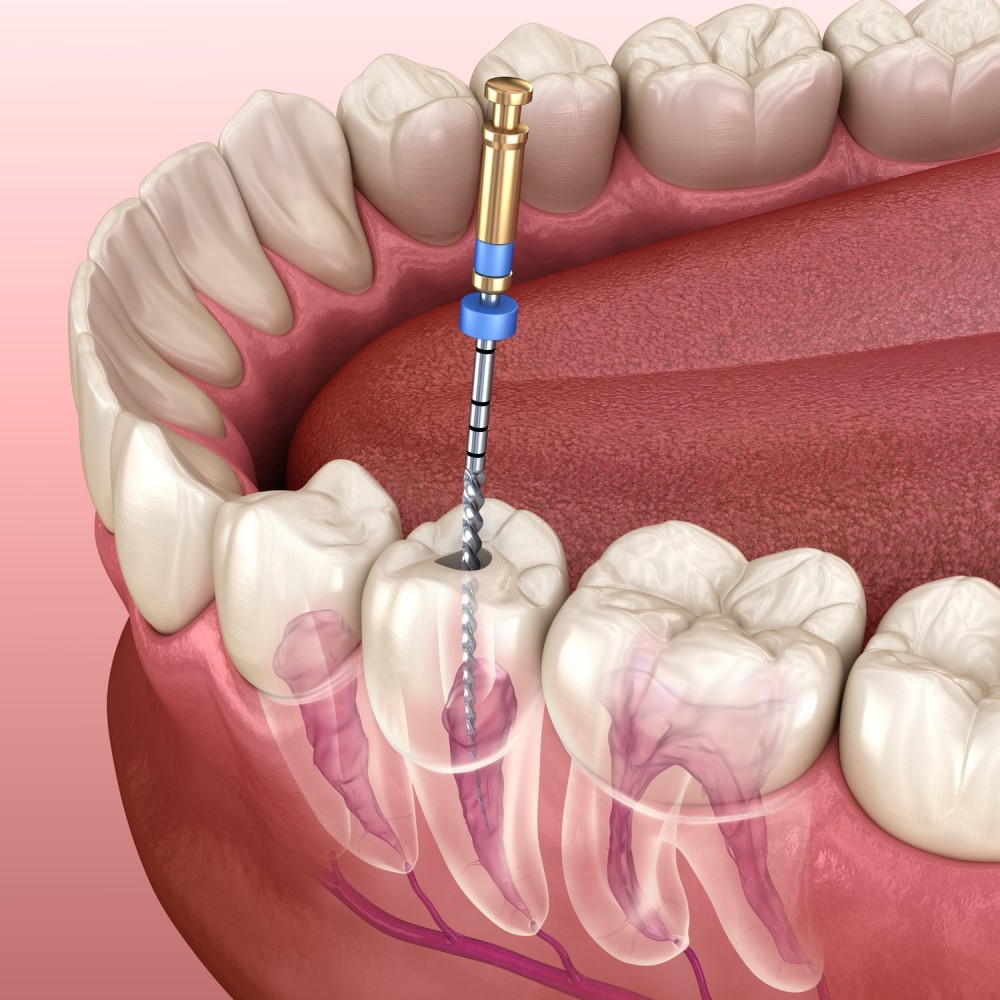How Long Does A Root Canal Take? Everything You Need to Know
Written by Dr. Jesse Hofer, DMD January 23, 2025 08:52
If the idea of getting a root canal makes you a little nervous, you’re not alone. At Precision Oyster Bay Family Dental, we’ve helped countless patients feel at ease about this procedure. Root canals are often misunderstood, but the reality is they’re a safe, effective way to save your natural teeth—and they don’t take as long as many people think.
One of the first questions people ask is, “How long does a root canal take?” The short answer: it depends on the complexity of your tooth and the level of care needed.
In this article, we’ll break down how long root canals typically take, the factors that influence the timeline, and what you can expect during and after the procedure. If you're considering a root canal and want to learn more, our team at Precision Oyster Bay is here to make the process as transparent as possible. Click here to learn more about our endodontics services, or call us today at (516) 400-4735—we’d love to get to know you!
Typical Root Canal Procedure Time
For most patients, a root canal can be completed in 30 minutes to 2 hours. This includes the time it takes to numb the area, clean out the infection, and seal the tooth. Some treatments are more straightforward, while others—especially molars with multiple canals—may require a second visit.
Here’s a general breakdown of timing:
- Front Teeth (incisors and canines): These are simpler to treat because they typically have just one root canal. You can expect your appointment to take about 1–1.5 hours.
- Premolars and Molars: Molars are larger and more complex, with multiple canals that require careful cleaning and filling. This can take closer to 1.5–2 hours or require an additional visit.
If a crown is part of your treatment plan, you might need a follow-up visit. The crown is typically placed after the tooth has had time to heal and the infection is fully resolved.
What Is a Root Canal?
A root canal is a treatment to save a tooth that has been damaged by decay, trauma, or infection.
Inside every tooth is a soft tissue called the pulp, which contains nerves, blood vessels, and connective tissue. When the pulp becomes inflamed or infected, it can cause significant pain—and even lead to tooth loss if untreated.
During a root canal, we:

- Remove the infected pulp inside the tooth.
- Clean and disinfect the root canals.
- Fill and seal the canals to prevent further infection.
Think of it as a rescue mission for your tooth! Rather than extracting the tooth, a root canal preserves its structure, allowing you to bite, chew, and smile with confidence.
If you're unsure as to whether you need a root canal, check out our guide for more insights.
Factors That Affect Root Canal Duration
The time required for a root canal can vary depending on several factors:
- Tooth Location: Front teeth with a single canal are faster to treat than molars, which have up to four canals.
- Severity of Infection: If the infection is extensive, your dentist may need extra time to thoroughly clean and disinfect the canals.
- Complexity of Anatomy: Curved or narrow canals can add to the procedure’s duration.
- Previous Dental Work: If you’ve had dental work on the same tooth before, it might take longer to navigate existing restorations.
- Need for a Crown: If your tooth requires a crown, this may extend the treatment time or necessitate a follow-up visit, as it requires crafting a custom fit.
Your dentist’s expertise and use of modern technology can also make a big difference. At Precision Oyster Bay, we use advanced imaging and tools to make this process as efficient and comfortable as possible.
Single vs. Multiple Sessions
While many root canals are completed in a single visit, some cases may call for multiple appointments.
- Single-Session Root Canals: If the infection is minor or the tooth is straightforward to treat, everything can often be done in one appointment.
- Two-Session Root Canals: For more severe infections or complex cases, your dentist may clean the canals in the first visit and place a temporary filling before sealing the tooth in the second session.
At Precision Oyster Bay, your comfort and care are our priorities. We’ll walk you through the process during your consultation so you know exactly what to expect. If multiple visits are needed, we’ll explain why and work around your schedule to minimize inconvenience.
Pain and Discomfort During the Procedure
Let’s bust a common myth: root canals don’t have to be painful. With modern anesthetics and techniques, most patients report little to no discomfort during the procedure.
Here’s what ensures your comfort:
- Local Anesthesia: Numbing the area ensures you won’t feel pain during treatment.
- Sedation Options: For patients with dental anxiety, options like nitrous oxide (laughing gas) can make the experience even more comfortable.
After the procedure, it’s normal to feel some tenderness or mild discomfort, but it typically subsides within a few days. Over-the-counter pain relievers usually do the trick.
Post-Treatment Recovery Time
Recovery after a root canal is usually quick and straightforward. Here’s what you can expect:
- Immediate Aftermath: You might feel numbness for a few hours after the procedure. Stick to soft foods for the first day or two and avoid chewing on the treated side.
- Tenderness: You might feel slight discomfort, similar to a bruised sensation, around the treated tooth for a few days. This is common but totally manageable with OTC pain relief.
- Follow-Up Care: If a crown is needed, you’ll return for a second visit to complete the restoration.
With proper care, your restored tooth can last a lifetime.
Tips for Preparing for a Root Canal
Feeling nervous? Don’t worry—we’ve seen it all. Here are some pointers for feeling more at ease before your appointment:
- Ask Questions: Knowing what to expect can make the experience less daunting.
- Follow Instructions: Your dentist may recommend pre-procedure steps, like taking antibiotics if there’s an infection or avoiding certain foods or medications beforehand.
- Relax Beforehand: Listen to calming music or practice deep breathing exercises.
- Bring Headphones: Tuning into your favorite podcast or playlist during the procedure can make the time fly by.
Remember, you’re in good hands. At Precision Oyster Bay, we make it our mission to ensure every patient feels at ease.

Get in Touch to Find Out More
A root canal can save your tooth, relieve pain, and improve your overall oral health—all without being the ordeal many people imagine. The key is choosing a dental team that understands your concerns and takes the time to put you at ease.
At Precision Oyster Bay Family Dental, we’re here to make your experience as seamless and stress-free as possible. If you're ready to learn more about root canal treatments or need personalized care, contact us or call us today at (516) 400-4735 to get started.
FAQs
How long does a root canal take?
Most root canals take 30 minutes to 2 hours, depending on the complexity of the tooth and the need for additional treatments.
How long does it take to do a root canal on a molar?
Molars typically take longer—about 1.5 to 2 hours—because they have multiple canals.
How long does a root canal procedure take with a crown?
If a crown is needed, the process may require a second visit for placement, adding about 1–2 weeks to the overall timeline.
What is endodontics?
Endodontics is the branch of dentistry that focuses on treating the inside of the tooth, including root canals. You can learn more about it here.
How to know if you need a root canal?
Signs include persistent tooth pain, sensitivity to hot or cold, and swelling around the tooth. Consult your dentist for a proper evaluation.
Bibliography
- Kathryn Watson, "How Long Will I Have to Sit in the Dentist Chair During a Root Canal?", healthline.com, April 21, 2020, https://www.healthline.com/health/how-long-does-a-root-canal-take
- "How it is performed: Root canal treatment", nhs.uk, January 27, 2022, https://www.nhs.uk/conditions/root-canal-treatment/what-happens/
- “Root Canal”, my.clevelandclinic.org, November 20, 2023, https://my.clevelandclinic.org/health/treatments/21759-root-canal